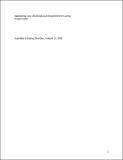| dc.contributor.author | Failler, Angela | |
| dc.date.accessioned | 2021-01-11T18:48:49Z | |
| dc.date.available | 2021-01-11T18:48:49Z | |
| dc.date.issued | 2006-08-21 | |
| dc.identifier.citation | Failler, Angela. “Appetizing loss: Anorexia as an experiment in living.” Eating Disorders 14 (2006): 99-107. DOI: 10.1080/10640260500536235. | en_US |
| dc.identifier.issn | 1064-0266 | |
| dc.identifier.uri | https://hdl.handle.net/10680/1893 | |
| dc.description | Accepted version of manuscript | en_US |
| dc.description.abstract | This paper turns upside-down the commonly held assumption that anorexia nervosa is inherently destructive or counter-productive. The author delves beneath the façade of anorexia’s main symptom, self-starvation, to explore what refusing to eat accomplishes, psychically, for the sufferer. Featured in this paper are the clinical reflections of contemporary child analyst Adam Phillips who argues that symptoms, such as those in anorexia, are “experiments in living.” In his view, anorexia is a particular way of testing the environment for its capacity to withstand and satisfy one’s desires. Working also with the notion that anorexia is an attempt at compensation for traumatic loss or affective rupture, attention is drawn to both the inter-personal and intra-personal contexts within which self-starvation is pursued. Importantly, this approach recognizes that responses by those around the anorexic individual affect the conditions within which possibilities for recovery are made. | en_US |
| dc.description.uri | https://www.tandfonline.com/doi/full/10.1080/10640260500536235 | en_US |
| dc.language.iso | en | en_US |
| dc.publisher | Taylor & Francis | en_US |
| dc.rights | info:eu-repo/semantics/openAccess | en_US |
| dc.subject | Anorexia nervosa | en_US |
| dc.title | Appetizing loss: Anorexia as an experiment in living | en_US |
| dc.type | Article | en_US |
| dc.identifier.doi | 10.1080/10640260500536235 | en_US |

